#Killing Eve s3e05
Text
Week 5 of Clown Theories and Analysis
S03E05 - Are You From Pinner?
So this episode is definitely top three favorite for me. Jodie’s talent and performance continues to amaze me. Villanelle has really developed since season 1 and her development really peaked with this episode. Even her development throughout this episode was substantial which is what I will focus on in this post.
Who are you? - V stopping to look at pictures and picking up things through the house was a nice touch. You could really see how she was transported back to her childhood in Russia when she picked up certain items like the soda. And how she was piecing together what she could of the years she lost with her family in the photographs on the wall. I can imagine it must have pained her a bit to see her mother in the photos seeing as she hasn’t seen her mother or pictures of her in many years.
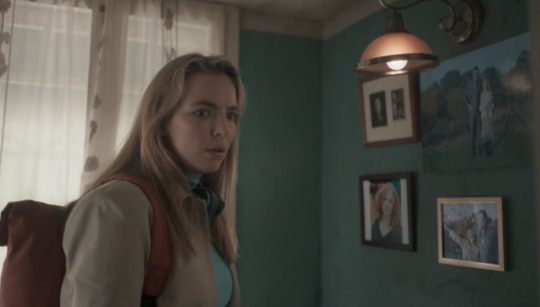
There’s a lot of initial shock here, mixed in with nostalgia. I think a big part of the shock we see here is due to how content her mother looks in the photos with people V doesn’t know. Given her history with her mother, V might have expected her mother to be on her own, maybe with her brother, Pyotr. I think the last thing she expected was to see her mother happy with a family. Especially since V sees her mother carrying the same darkness and V is, for the most part, alone. So she might have expected the same of her mother.
Whatever emotions she’s feeling though are soon buried and her behavior quickly becomes playful and coy when approached by the different members of the family until her mom comes home and she starts to panic.
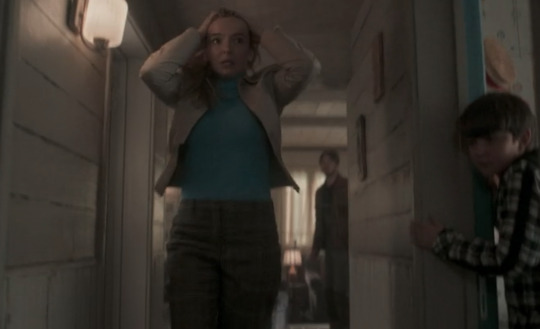
She had to know that her mom would be there or at least, be there soon. So why panic? I think up until she heard the car in the driveway, she hadn’t really thought about the repercussions of going to see her family or what it would be like to see her mom again. I think once she heard her outside, the panic set in as it really dawned on her that she would really see her mother again. For a moment, she was transported back to her childhood and saw who her mother really was, and not the smiling wife and mother in the photographs on the wall.
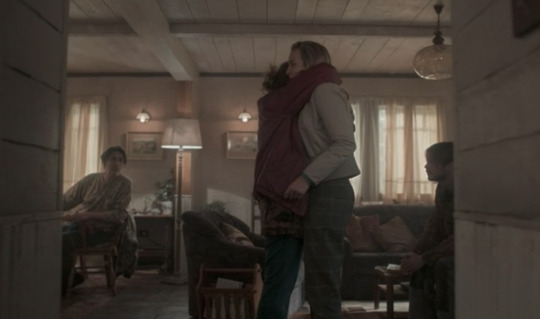
Here, V is clearly shocked by her mother’s reaction to seeing her daughter alive but about halfway through the hug, V’s facial expression changes to show a little bit of anger? Also maybe disbelief at her mother’s behavior, maybe she doesn’t believe her reaction to be genuine, instead she sees it as part of her act. It seems that her mother never shows her true self when other people are around, I can imagine it was much the same when V was a child since her father never picked up on who her mother really was. So V probably thinks the same of this scene, that her mother is putting up an act since other people are around.
Many is a very loose term. - So the details about the orphanage explains the arson in her prison file, well one account of arson seeing as she did it twice. I wonder if the manslaughter of a minor had something to do with the orphanage or perhaps that’s what landed her in a juvenile detention center later in life.
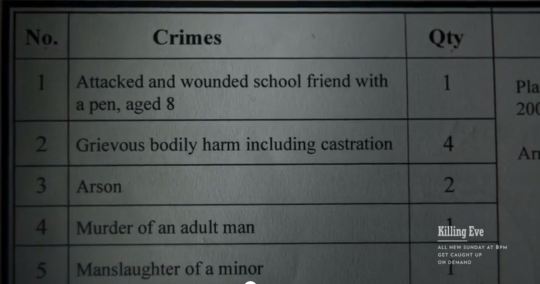
You can tell that V’s mother really wasn’t bothered by the fact that V killed “many” people nor by the nonchalant response V gave her regarding that. This is one of the first hints we get about her mother’s darkness. You can also see that V isn’t bothered by the fact that she was dumped at the orphanage during this scene, they talk about it as if they’re having a normal conversation. Which adds depth to V saying “I didn’t mind that you took me there” at the end of the episode.
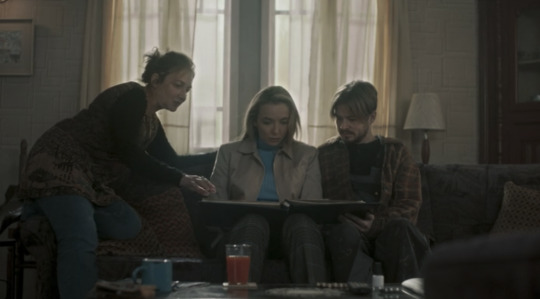
You can tell that V’s guard is still up around her mother but I think she lowers it a bit as curiosity takes over when going through the photos as she starts asking more questions trying to piece together the last several years.
“Why didn’t you leave him?” “Is that me?” “Where’s dad?”
It’s sad that V didn’t get to see a picture of her dad, you can tell she really cared about him.
Welcome home, Oksana. - You can tell that V is still feeling really out of place but she’s trying to fit in. I think a big part of that has to do with still getting over the initial shock of seeing her mother in a “new light” and getting used to the rest of the family. She seems to be really comfortable with Bor’ka and Pyotr though. I don’t think V really knew what to expect when she came to Russia but I think the last thing she expected was to play cards with her family and then break out into song. I think that’s when she realized that they’re all a bunch of misfits and that she actually might fit in more than she expected.

While rewatching, I found the scene where they were playing cards to be interesting. The step-brother (I forgot his name) was accusing V of being the “killer” but in actuality it was her mom, I thought that was an interesting parallel for the ending where V is saying that her and her mother are the same. It also made me wonder if her mother is actually a killer and if maybe she had something to do with her dad’s death. I don’t think they ever explained what happened to him. Correct me, if I’m wrong though!
Having a moment. - The relationship between Pyotr and V is really cute, you can tell that he really cares about her and missed her. And while V doesn’t show it much through her actions or her words, you can tell she cares too. Like when she’s telling him to get away from their mother and do what he wants to do. It also seems like he is the only one that V is most comfortable being herself around.
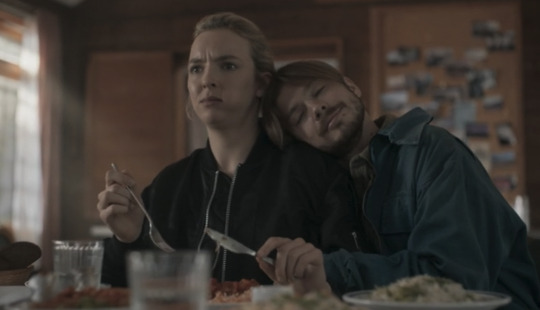
Also watching V eat in this scene with the way her teeth dragged against the fork made my teeth hurt.
She was different. - In the conversation with her step-father, you can see that V is trying to figure out if he knew the type of person her mother is. Through the conversation, she’s able to distinguish that the only things that her mother shared with him was how difficult a child Villanelle was and how things were so hard for her during that time making it seem like V only made it worse. Nothing about how her mother was basically the same type of difficult person that V is. Typical gaslighting.
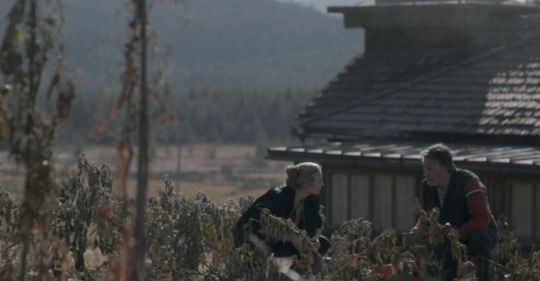
You can see that V isn’t really surprised by it either. And then, right on cue, her mother comes out with tea and offers a gift to V. Throughout the episode, you see V’s mother being overly nice and emotional toward V who takes it with a grain of salt for most of the episode until the end, of course. I think V was genuinely surprised and happy to receive the gift from her mother, despite not fully believing the act she puts on.
The Harvest Festival - It was really refreshing to see V actually enjoy herself at the festival when playing all of the different games and then when her family cheered for her when she won first place. I think this is where she really felt like she found somewhere she belonged. I think when Bor’ka lost the competition for best pirozhki and her mother came up to talk to him, she began to think that maybe she had changed after all (until she finds out what she actually said later on).

Also can we talk about how V actually feels bad for him? We’ve seen V continue to sympathize with so many people this season and it still surprises me each time. S1 Villanelle would never haha if that’s not growth then idk what is. I really like how V seems to care about Bor’ka and bonds with him throughout the episode, especially during the dancing scene at the end of the festival when he starts hitting himself. You even see her trying to console him in her own way.

Here is when V realizes that her mother really hasn’t changed at all and she’s probably upset with herself for believing that she did even if it was just briefly. I really liked this scene, how it distorted and faded out with the song playing “I see darkness in you” and the whole mood just shifts and transitions to V in the kitchen.
I want to feel like one. - V asking her mom to clean her face for her was a vulnerable moment for her. Even the “please” she added after. How often do we hear V say please? V is often very childish and in this moment, she really need her mother to act like a mother but she didn’t. She was trying to connect with her mother in the only way she knew how. The last time she saw her, she was a child so V wanted to pick up where they left off only to be disappointed yet again. Throughout the episode, you see her mother putting up an act, pretending to be the nice mother that everyone sees, but when it’s just her and V while everyone is asleep, she shows her true self.
I am my mother’s daughter. - Another fantastic performance from Jodie! She never ceases to amaze me. This scene was the tipping point for V. Her mother’s response here is what would have made or broken her. V cared for her father a lot and having her mother constantly blaming V for “taking everything from her” and “controlling her father and taking him from her” took a toll on V. Especially since the whole time her mother was pointing her finger at her and never once acknowledging her role in everything.
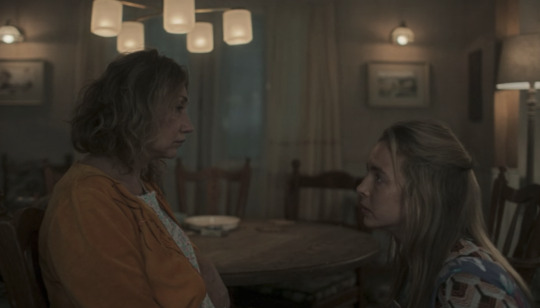
The way V is literally kneeling in front of her (when have we ever seen her make herself smaller for anyone?) practically begging her mother to admit that she’s the same. She can barely keep herself together, it’s taking everything to keep it together. But her mother doesn’t relent, making V feel more alone and shittier than she did before. As soon as her mother tells her to leave again, you see V break her composure for a bit before making the decision to kill her. She even has to stop for a sec while saying it (”I think I need to kill you, mama”), because maybe she is even in disbelief by what she’s about to do, or perhaps hesitant to do it. But V probably thinks that the only way she would free herself of what she is feeling would be by killing her. Which, it doesn’t, of course. The damage was done and nothing could have made that better for her. It just left her all the more damaged.
On a side note, I like how even in the mental state that she was in, she still saved Bor’ka and left money for him to go live out his dream.
Crocodile Rock - That’s the name of the song V was listening to at the end of the episode, right?
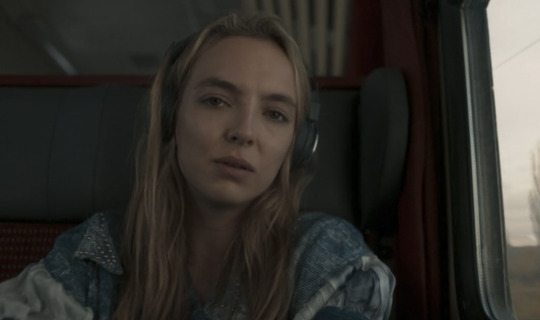
So V is completely unhinged now. This trip to see her family left her more broken and hurt than she was before. She’s lost all her composure as you can see through the constant moving and jittering, trying to focus on the music but her emotions are spilling out of her, making that impossible. At some points, she’s almost smiling while there are tears in her eyes. Wearing the clothes her mother made for her, just adds to the broken mental state she’s in here. She’s desperately trying to keep her composure but she opened the floodgates and there’s no containing the emotions anymore. There’s no going back or doing things differently. This will definitely have lasting effects on V throughout the rest of the season.
OVERALL - Amazing episode! I really really enjoyed it. Jodie did a phenomenal job as always. The writing for this episode was also really great, shoutout to Suzanne Heathcote. I know some people are saying that the plot didn’t really progress here but I think this episode is really going to drive Villanelle through the last three episode of this season. It’s going to have a huge impact on her and I think we’ll definitely be seeing that sooner rather than later.
#Killing Eve#Killing Eve spoilers#Killing Eve season 3#Killing Eve season 3 spoilers#Killing Eve s3e05#Jodie Comer#Villanelle#Oksana#Oksana Astankova
226 notes
·
View notes
Text
Perspective: Killing Eve Season 3 Retcon – Can a show Retcon itself into a different genre?
Recently, I learned about the term ‘Retroactive Continuity’ and I am pretty proud of it because now it sounds like I know what I’m talking about. Retroactive Continuity, or retcon for the intimate like me, is the addition of new information that changes or reinterprets events/narratives previously established, therefore opening new possibilities for the future. It can correct inconsistencies, change world/character limitations, or allow for a dramatic plot twist. For example, a character previously established as an incurable psychopath goes on an emotional growth journey. Killing Eve got fundamentally retconned season 3 and it changes everything. And I need to talk about it. (Look, it’s been a while I wrote this and re-addressed some points here :) )
Villanelle is not a psychopath anymore, I guess
Villanelle was written explicitly as a primary psychopath meaning she was mainly born this way®. Which is different from a Secondary psychopath, whose emotional developmental arrest is caused by disturbingly severe neglect and abuse in early infancy. The impairments in their brains and psychological development prevents them from thinking and, most importantly, feeling like a regular person do. They have a different subjective experience. Psychopathy is incurable in adults, which sets limitations to character development.
Villanelle can’t empathize, perceives people as objects and is very utilitarian. She doesn’t know how to show people she likes them, and her idea of love is possession. Endearing as she is, this is the character the writers wrote. And this is the character portrayed to us in the show. Villanelle is unapologetically a psychopath. She is remorseless, amoral, derives pleasure from killing, all the better to get paid for it. She is basically a self-indulgent goddess. This is enunciated repeatedly in Season 1. Of course, we are not just told, we are shown. Her face glimmers in every kill with enjoyment and cruelty. She is able to conjure any emotion to manipulate – depicted more terrifyingly with Nadia. She emulates emotions from others to connect with people like depicted in the opening scene. My favorite chilling moment is when she gives the “what it is like to die” monologue to Frank, just to terrify him before killing him. Or this face:

Season 2 dives deeper into her psyche where she tells us how she feels, or better yet, doesn’t. We establish she feels this overbearing boredom and seeks to feel anything, so she collects things (or people, no difference) that make her feel something and these things she cherishes by possessing them. The poverty of emotion is reiterated. Again, we are shown, not only told, time and again. The writers are quite clearly asking us to just accept Villanelle for what she is: a psychopath. Like Jodie Comer said herself during that season: “I think some people are bad and that’s what they are, and I don’t think she should be redeemed.” It felt impossible to make it more established within the narrative and the world building. She is, like all adult psychopaths, incurable. These are the character’s limitations, in a purely storytelling sense.
Then, Season 3 happened. In season 3 Villanelle’s character’s development is irreconcilable with the previous seasons. Much of the character’s limitations were simply erased to give her room to “grow”, starting early with one of my favorite scenes of the entire season:
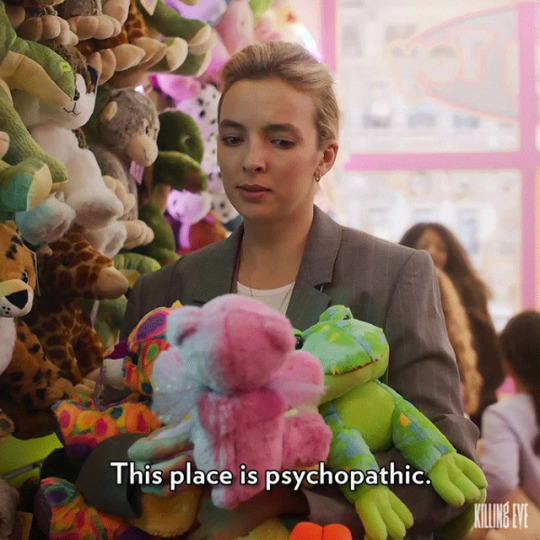
It was marvelously shot and so symbolic. This time around she is gifting Eve something intimate and safe: a teddy bear. Then we have Villanelle by herself and vulnerable, stripping the layers of her feelings towards Eve, the mask of anger cracking as she tries to convince herself she wanted Eve dead, to finally giving in to longing. Her own words are repeated back at her in a loop in a little booth. It was an admission. The booth, the privacy, the lighting, the acting: It was a confession. More than that: it was a love confession. As if falling in love was something she could now do? I don’t want to entertain the actual nature of her feeling, but this is a level of emotional complexity she is just prohibited of displaying by the character’s limitations. And yet, it happened. And I will argue, all the elements of this scene deliberately lead the audience to believe these were romantic feelings.
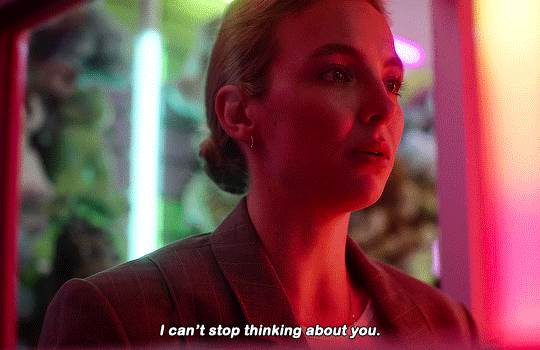
But this is foreshadowing, and the major shift in perspective happens in her bottle episode. In this episode we see Villanelle display genuine empathy and care for her brothers, not only by sparing them but by giving them more than enough money to go see Elton John. A bonna fide display of correctly conveyed affection and consideration. Which, again, is prohibited by the characters limitations. Then the episode builds the narrative that her “psychopathy” was the result of her abusive upbringing, especially in the confrontation with her mother, when we are clearly asked to side with Villanelle.
Here is where the show subtly retcons Villanelle’s character. It cleverly never denies she is a psychopath. It retcons her ability to emotionally grow, by shifting the emphasis to childhood trauma. Nevertheless, for Villanelle as a character, the emotional growth is still prohibited – despite of trauma. The sleight of hand is passable because audiences (actually, any empathic human being) find it incredibly hard to grasp that trauma cannot be overcome. That’s why it feels plausible she has a very complex, deeply transforming emotional response to killing her mother, despite still being a psychopath. Because that is a response that feels plausible to us, the audience, despite being inconsistent with what is plausible for the character’s the inner experience of reality.
This shift not only changes all the interpretation of her character that was previously established but also changes all future interactions. Here is where we see Villanelle getting conflicted about killing, not in a utilitarian sense of it being impractical or boring, but in an emotional struggle. She starts to worry about how others perceive her, and specially that she is perceived only as a “monster”, pointing to a development of a moral compass, deeper self-awareness, self-evaluation and ability to feel remorse. This is all not only incredibly far-fetched: it was prohibited. This is a clear break in continuity from the character of previous seasons. However, after S3E05 it feels plausible.

Villanelle is a carefully crafted monster
We are, then, asked to believe that Villanelle was made into a ruthless killer, which logically follow can be unmade. Hence, her past needs to be explored so it can also be somewhat resolved, symbolizing the undoing of her atrocious (but delightfull?) persona “Villanelle” (the distinction between Oksana and Villanelle was useless before and should still be. But now it feels like it makes sense). Initially, it was established that her mother died, and she had an abusive drunk father who abandoned her in an orphanage. While I believe there was potential in creating a convincing traumatic abusive background from the established narrative, it may have seemed too unsettling to have a man mistreat an infant, which might explain the writers choice for such through retcon. Transferring the source of the neglect to the mother, might heighten the stakes, since daughters are expected to develop a strong bond and mirror their mothers. Thus, adding depth to their face-off and making her murder more symbolic. Addicionally, a full house – with her mother, stepfather and brothers –would allow Villanelle to flesh out her relationship to family and explore the conflict more thoroughly before confrontation. Despite the symbolic tension, in the end we have no definitive answer to the nature x nurture question, nor to what happened in Villanelle’s infancy, except that the metaphorical darkness may have been passed on from her mother.
Villanelle’s joy in cruelty is the most alienating aspect of her character – also the most gripping – and thus, in order for her arc to be more digestible and relatable, it also needs explicit retconning, which is mostly explored through her relationship with killing. Therefore, her cruelty is also displaced to her abusive upbringing. Most specifically, displaced to another character: Dasha. She is the source of the cruelty transmitted into Villanelle through severe trauma during her teenagerhood, ingeniously avoiding the gravity of discussing infant abuse (Dasha brings a downpour of plot inconsistencies). This is unmistakably conveyed in this scene:

Villanelle was something soft and whole that got broken and reshaped into steel, into a stone cold killer, by external forces. Thus, Dasha is an estranged mother figure from the past who tortured Villanelle into a killer, mirroring the dynamic between Villanelle and her mother. Since there is no clear narrative surrounding her early infancy, and her mother needed to be killed to spark the transformation, Dasha becomes the surrogate through which the conflict of Villanelle’s transformation can be explored. The story doubles its efforts to get the audiences to not only believe Villanelle can change, but also that she deserves to change. And here is where we enter dangerous territory.
Killing Eve is not a spy-drama anymore, it is a rescue romance
I stand with the writers, Killing Eve was not a romance. Not until Season 3. The topic of how audiences, especially queer fans, perceive the show as a romance is worth a whole essay on its own. However, in Season 3, audiences are treated with a romantic atmosphere (remember the teddy bear scene?). Everything is toned down; the pace is slower and the investigation is put to the side. The cat-and-cat game is replaced with this reinforced sense of destiny, of fate, where characters seamlessly come together, as if all their actions were just leading them up to that moment. Their approach carries no sense of danger, their obsession is replaced with anticipation. Characters stop thinking about each other neurotically, that scrumptious voyeurism is gone. Character’s don’t need to be reminded of each other. There is no need for it anymore, it has been written for them. They will meet each other, no need to pursue.
Gone is also Eve’s curiosity and intrigue about Villanelle, along most of her character’s motivations, with one simple retcon: Eve wants to rescue Villanelle.

To which Eve replies: I don’t think so. Meaning “I believe there is more to Villanelle than killing and I will cling to that” (Why, we don’t know. But that’s for another time)
Previously, despite the irresistible attraction Eve felt for Villanelle, the story never portrayed Eve as trying to redeem her. It was precisely the fact that they are polar opposites that brings them together, each trying to quench a deep hunger through the other, in all the wrong ways. Eve pursues in Villanelle much of her unfulfilled impulses and is challenged to embody them herself. Eve’s never been attracted to what Villanelle might have of redeemable, she was drawn to what Villanelle had of profanely feral. On the other hand, Villanelle longs for the safety and intimacy she sees in Eve but has no way of even comprehending what it means.
This honesty to the character’s true desires and realities is what has allowed the show to explore an enticingly destructive dynamic while avoiding romanticizing it, which would downgrade the show to a disservice. However, ultimately, there is a writer trying to sell a story. And in this case, they are setting up a redemption arc within a romance, despite character desires and realities not aligning with that. But in season 3, Villanelle’s psychopathy got retconned to make her crush on Eve without it being too problematic and Eve’s past season character development got simply blissfully ignored so her crush on Villanelle could flourish without it being too problematic, and in the end, their attraction got stripped away from all it’s complexity and danger so they could bring characters together without it being too problematic. These characters got rewritten to give us the tease of a romance we have seen iterated one million times elsewhere.
The premise of the show was to explore the dangerous temptation to bite the proverbial apple. Still, at some point the tension needs to be resolved, and the writers decided to shift it to a rescue romance. A very slippery slope. A slippery slope to romanticizing disturbingly destructive relationships, to perpetrating the cliché that “Love redeems all”, even psychopaths can change if they have someone who believes in them – not only dangerously dishonest but painfully dull. As if somehow having your life and your sense of self ruined for a person is some sort of martyrdom to match the person’s redemption itself. What a beautiful pair they would make, cozy in heaven. But damned be the day Killing Eve becomes cozy. While writing the redemption of the serpent and the power of female love despite the obliteration of Eden; they forgot the most delicious part of the story was the apple.
#killing eve#killingeve#killingeveperspectives#killing eve season three#killing eve s3#killing eve review#killingeve retcon#villanelle#villanelle retcon
53 notes
·
View notes